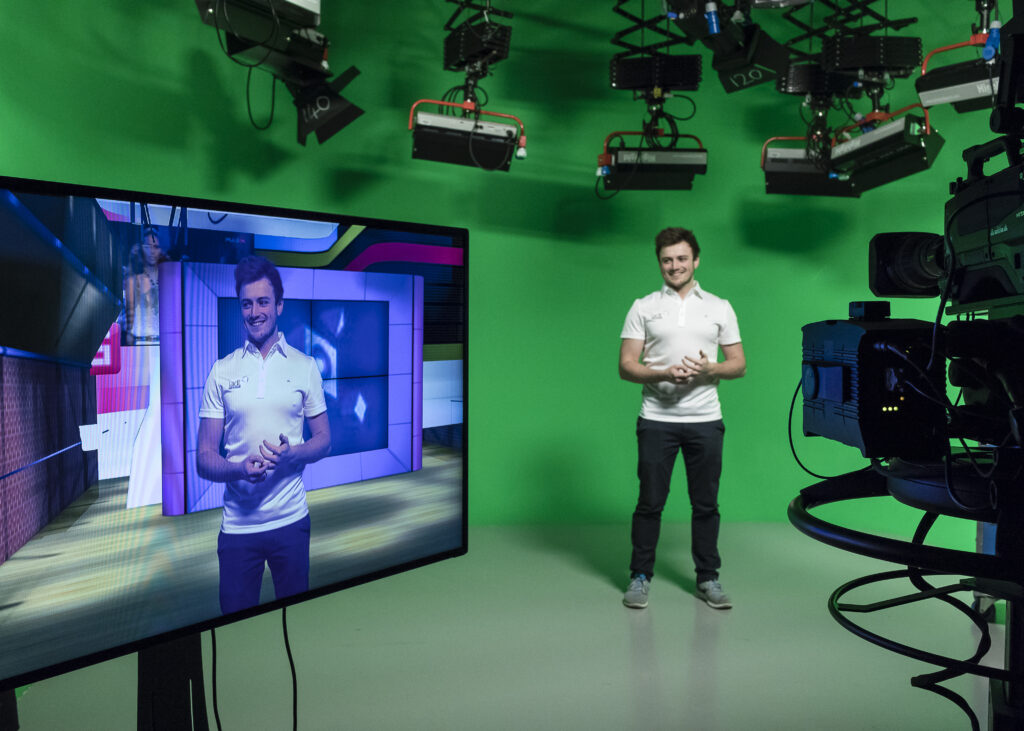
Certificate in Real-Time Virtual Production
Apply To
IADT
ECTS Points
10
Funding
HCI Subsidy Funding Available*
Course Code
Level 9
Duration
Online with two in-person Saturday classes
Fees
€1,100 or €550 *

IADT
10
HCI Subsidy Funding Available*
Level 9
Online with two in-person Saturday classes
€1,100 or €550 *

Note: This course is no longer accepting applications for 2024/25. To register your interest in the next intake, please email cfa@iadt.ie
Real-time virtual production is transforming the way films and media are created, by combining live-action footage with digitally generated environments and effects in real time. Powered by cutting-edge technologies such as Unreal Engine, virtual production enables filmmakers to create and visualize fully immersive environments during filming, rather than relying on traditional post-production workflows. This allows for greater creative freedom and real-time decision-making on set, blending the lines between the physical and virtual worlds.
Using Unreal Engine, a leading real-time 3D creation tool, virtual production integrates live-action performances with pre-visualized digital elements like sets, effects, and lighting. This seamless interaction between physical and digital elements allows filmmakers to visualize final shots immediately, helping to enhance storytelling and optimize production time.
This course is about learning how to use Unreal, a powerful real-time engine, to create visual content that can be used both in video games and in film production. It explores the similarities and differences in content creation for these two industries and provides hands-on experience in adapting game development tools for film and animation projects. The primary focus is on the technical skills and creative techniques needed to efficiently transition game assets and scenes into visual narratives.
Unreal Engine’s Interface and Core Tools:
Deep dive into Unreal Engine’s interface, focusing on navigation, its comprehensive toolsets, and customization options to streamline workflows for film and game production. Explore features like the Blueprint visual scripting system, Editor Customization, and Workspace Management to enhance productivity.
Workflow Analysis:
Comparison of game and film production pipelines in Unreal Engine, examining how to adapt the workflow when shifting from game design to film production. This includes the integration of storyboards, scene setup, and adapting real-time interactive elements for cinematic production.
Engine Capabilities Exploration:
Detailed exploration of Unreal Engine’s advanced rendering capabilities, such as real-time global illumination (Lumen), dynamic shaders, physics simulations, and the use of ray tracing to enhance realism in film projects.
Advanced Camera Techniques:
Leverage Unreal’s powerful Cine Camera Actor and Sequencer tools, along with Cinemachine-like tools for dynamic camera control. Explore advanced techniques to simulate traditional film equipment (e.g., cranes, dollies, handheld cameras) for achieving cinematic shots in real-time.
Professional Lighting Setups:
Master Unreal Engine’s lighting system, focusing on achieving cinematic-quality results with real-time lighting, shadow casting, and ray-traced reflections. Learn techniques for realistic light setup that enhances visual storytelling.
Post-Processing for Film:
In-depth use of Unreal Engine’s post-processing volume to achieve film-grade visual effects, including color grading, bloom, lens flares, film grain, and vignettes. Learn how to refine the final visual output for a cinematic look and feel.
High-Performance Asset Optimization:
Techniques for optimizing high-polygon models and complex textures for smooth performance in Unreal Engine, using tools like Nanite for handling highly detailed assets without sacrificing performance.
Efficient Asset Workflow:
Developing a streamlined asset management system, utilizing Unreal’s content browser with asset tagging, layering, and using Data Layers and Level Streaming for managing large-scale film projects.
Scene Building + Management:
Best practices in organizing scenes, hierarchies, and Blueprint prefabs to manage complex setups typical in film production. Learn how to manage and optimize complex environments and asset-heavy scenes for efficient real-time rendering.
Rendering Pipelines:
Detailed exploration of Unreal Engine’s rendering pipelines, focusing on Lumen (global illumination) and Nanite for high-quality real-time rendering in film production. Learn when and how to use these pipelines to achieve the best visual quality for cinematic projects.
Visual Effects + Simulation:
Creating sophisticated visual effects and environmental simulations using Unreal’s Niagara VFX system and Material Editor to craft realistic, film-quality visual scenes. Dive into particle systems, fluid simulations, and complex shader creation.
Scripting for Storytelling:
Techniques for using Unreal’s Blueprint to enhance narrative elements, including dynamic dialogue systems, narrative flow control, and scene transitions to drive the story forward.
Interactive Scene Elements:
Creating interactive film-like experiences where scenes respond to viewer input or evolve over time, adding interactive elements without needing full game mechanics. Explore ways to enhance viewer engagement with adaptive scenes and interactive storytelling.
Project-Based Learning.
Capstone Project: Development of a detailed project from concept to final presentation that demonstrates the application of Unreal in a film-oriented production.
Peer Collaboration and Review: Structured peer review sessions to provide feedback and simulate real-world revision processes, enhancing project outcomes.
Professional Portfolio Development: Guidance on compiling a professional portfolio that showcases a range of skills from technical proficiency to creative implementation in Unreal-based film projects.
Classes take place online on the following dates and times:
Monday, 20th January 2025 (7pm – 9.30pm)
Monday, 27th January (7pm – 9.30pm)
Tuesday, 4th February (7pm – 9.30pm)
Monday, 10th February (7pm – 9.30pm)
Monday, 17th February (7pm – 9pm)
Monday, 24th February (7pm – 9pm)
Monday, 3rd March (7pm – 9pm)
Classes take place on campus from 10am to 1pm on:
Saturday, 15th February
Saturday, 1st March
A system capable of running Unreal find minimum specs here:
Fees for this course in 2024/25 are €550, subsidised by the Higher Education Authority’s Human Capital Initiative. Check your eligibility HERE
Once offered a place on the course, you will be asked to complete a declaration form to confirm your eligibility.
Fees for those who do not meet the eligibility criteria above are €1,100.
CFA Scholarship:
A CFA scholarship encourages the participation of learners from sections of society that are significantly under-represented in higher education by offering one free place on all of our CFA short courses.
Find out if you are eligible to apply HERE
Fill in the CFA@IADT scholarship application form HERE
Course Lecturer: Naoise Collins
Please email any queries to Elena Somoza, IADT Creative Futures Academy Co-ordinator, at iadt@creativefutures.ie

Applicants to this course are eligible for Human Capital Initiative HCI Pillar 3 Micro-Credentials Subsidy funding. The subsidy for this course is 50% of the total course costs for eligible learners. Terms & Conditions apply.